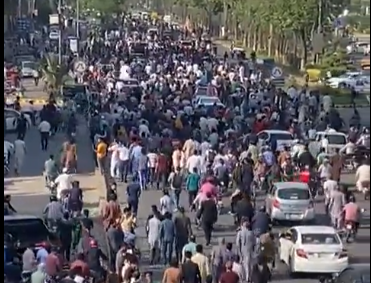Imran Khan, the former Prime Minister of Pakistan, was arrested at Islamabad High Court on Tuesday, by the nation’s anti-corruption agency — a move that has sparked massive protests across the country.
Police have been put on high alert in Khan’s hometown of Lahore as Khan’s Tehreek-e-Insaf (PTI) party called on supporters to “shut down Pakistan”. “It’s your time, people of Pakistan. Khan has always stood for you, now its time to stand for him,” the PTI wrote on Twitter.
Also Read | Imran Khan: Wife, age, net worth, career, family and more
Supporters are blocking streets in Lahore and the port city of Karachi, according to Reuters witnesses. There were also multiple vehicles set on fire after Khan’s arrest.
Here are some videos of the protests currently going on in Pakistan:
Khan’s arrest, caught on camera, showed dozens of security personnel in riot-control gear surrounding the former leader and leading him into a black van by his arm. The 70-year-old sportsman-turned-politician did not appear to resist the arrest.
Khan was ousted as prime minister last year. He was wounded in an attack on his life in November when he was leading a convoy in a protest march to Islamabad.
Pakistanis are currently undergoing the worst economic crisis with record-high inflation and almost negligible growth. They also have an ongoing dispute with the military dating to 2021.
Also Read | Imran Khan assassination attempt: Pakistan Tehreek-i-Insaf to hold nationwide protests for snap elections
This is not the first time that they have attempted to arrest Khan from his Lahore home. However, the previous attempts too resulted in heavy clashes between his supporters and the police.
According to Interior Minister Rana Sanaullah, Khan was arrested by the National Accountability Bureau (NAB) after he did not appear before it “despite notices”. On May 1, the NAB reportedly issued Khan’s arrest warrant. “Khan is accused of commission of the offense of corruption and corrupt practices,” it said.
The corruption allegations against Khan are not immediately clear.







